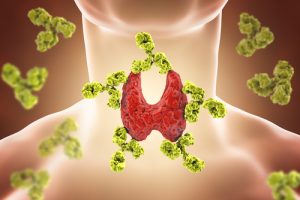
What is the Condition?
Hashimoto’s is an autoimmune disease when antibodies attack the thyroid gland. [F1]
What are the symptoms?
- stress
- fatigue, lack of energy, tiredness
- inflammation of the intestines, the thyroid gland, and other organs
- poor absorption of micronutrients in the intestines
- problems with perception, clear thinking, articulation, confusion, psychosis [F1]
What are the causes?
- stress hormones, oxidative stress, and allergies, resulting in excessive production of homocysteine
- celiac’s disease, anemia, and lack of micronutrients, which together with gluten-free diets can be a contributing factor
- disturbances of the microflora which result in permanent subliminal inflammation
- inappropriate medicines and the removal of certain inflamed organs [F1]
Potential impacts
- overstimulated immune system, intestinal inflammations, and even damages to other organs of the body
- Hashimoto’s encephalopathy, wherein immune cells attack the brain. Is not curable, but the impact can be reduced.
- brain atrophy, affects speech, morale drops, reason carelessly disregarded, possible suicidal tendencies [F1]
Deficiencies
- Most important micronutrients in gluten-free food–vitamin, zinc, iron, calcium, should be supplied separately
- Very important micronutrient[F1]
What are the treatments or remedies?
- not curable but the impact can be reduced
- supplemental hormone therapy – Levothyroxine or L-thyroxine; possibly take for life
- vital micronutrients
- (glutathione topical creme?)
- (gluten consumption can be a factor)
- cocoa, dark chocolate
- fish, especially salmon
- mushrooms
- brazil nuts
- asparagus
- small portions of lean meat
- fennel, lemon balm, thyme, and tea
- mock cereals such as buckwheat, quinoa, amaranth, millet, and gluten protein structures (allergens…)
- 1 to 2 portions of fruit portions (ideally low-sugar) per day, e.g.: berries, bananas, pineapples, mangos, grapes
- lemon water
- vegetables – prepared [not cooked?] with high quality oils, such as high quality algae oil, linseed/hemp oils, legumes
- milk
- eggs
- nuts, seeds of plants
- sweet potatoes
- selenium
- Ceylon cinnamon
- ginger
- pepper
- turmeric
- protein
- iron
- Omega 3 fatty acids; and minerals
- magnesium, calcium, vitamins A, B-complexes, C, D, E [F1]
Contraindications:
- Celiac disease, gluten intolerance, gluten free foods
- a gluten-free diet, reduces supply of vitamins and minerals
- coffee with caffeine
- cereals containing gluten, such as wheat, spelt, rye, and barley (?)
- raw brassicas (cruciferous vegetables) vegetables – (for their goitrogenic effect), can be countered with iodized salt
- strong foods containing too much iodine – e.g.: algae, factory-farmed meat containing too much iodine
- strongly spiced, smoked, fried, or very fatty foods
- white bread, toast, rusks [croutons], wheat and milk rolls, biscuits, white flour products
- nightshade vegetables such as tomatoes, potatoes, peppers, aubergine [eggplants]
- dairy products
- ready made products, fast foods
- diets high in sugar, fat and salt[F1]
Summation:
FIGU Sources:
F1: Contact Report 824